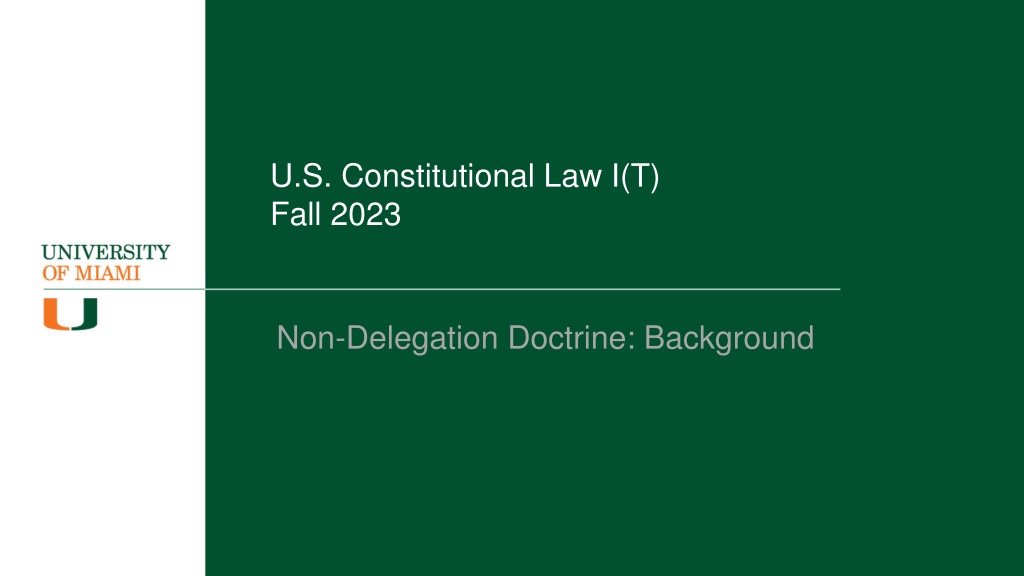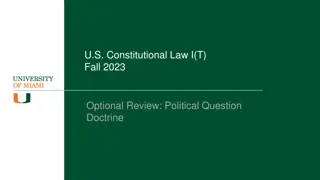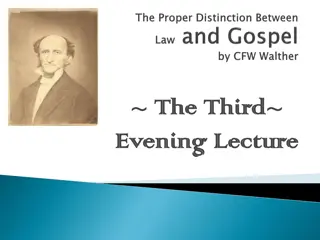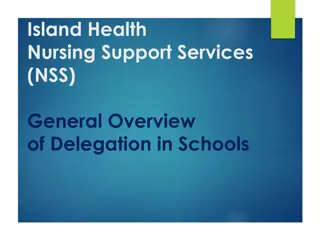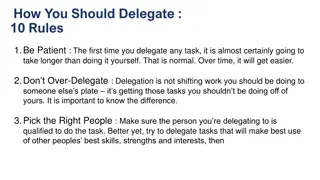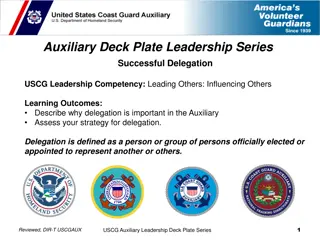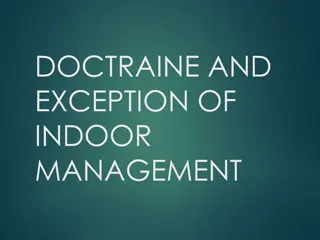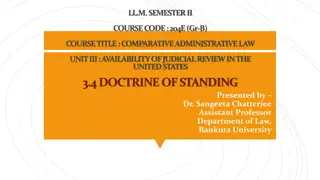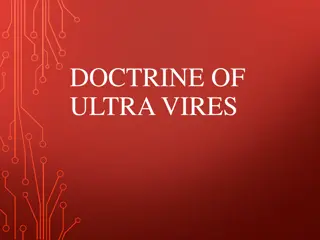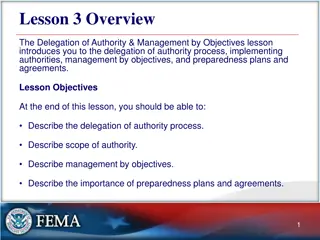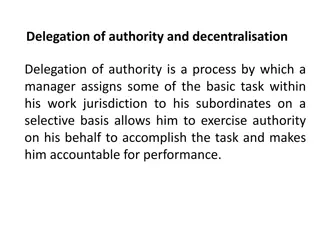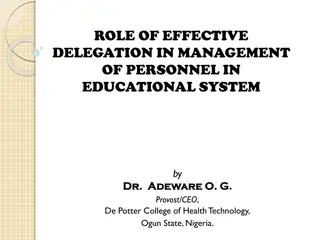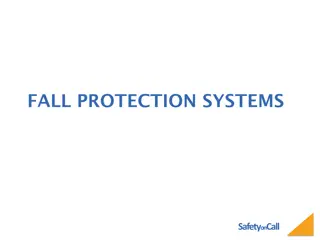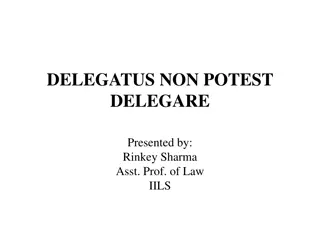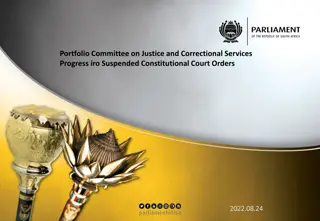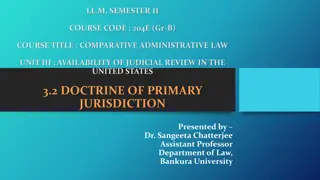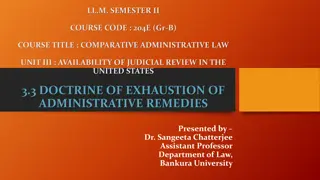U.S. Constitutional Law I(T) Fall 2023: Non-Delegation Doctrine Overview
Exploring the Non-Delegation Doctrine in U.S. Constitutional Law, this content delves into the background, current doctrine, historical cases, and contextual considerations related to congressional delegation of regulatory powers. It addresses the constitutionality of Congress authorizing bodies such as the SEC to regulate areas like cryptocurrencies and examines key Supreme Court rulings relevant to the doctrine. The discussion also touches on the balance of power between Congress and the Executive Branch regarding industry standards and governmental authority.
Download Presentation

Please find below an Image/Link to download the presentation.
The content on the website is provided AS IS for your information and personal use only. It may not be sold, licensed, or shared on other websites without obtaining consent from the author. Download presentation by click this link. If you encounter any issues during the download, it is possible that the publisher has removed the file from their server.
E N D
Presentation Transcript
U.S. Constitutional Law I(T) Fall 2023 Non-Delegation Doctrine: Background
Nondelegation Suppose Congress authorized the federal Securities and Exchange Commission (SEC) to regulate cryptocurrencies in the public interest, convenience and necessity. Is it consistent with the Constitution for Congress to do this?
Nondelegation Current doctrine: In theory, encapsulated in a 1928 case, Hampton (CB 377): Has Congress laid down by legislative act an intelligible principle to which the person or body authorized to take is directed to conform. Delegation upheld in Hampton. But
Nondelegation The last time the Supreme Court ruled statutes unconstitutional for under the non-delegation doctrine was in 1935: Panama Refining Co. (CB 377) ALA Schechter Poultry Corp (CB 377-78) These cases concerned the National Industrial Recovery Act, a key New Deal/Depression statute
Nondelegation Context: The Court also held the NIRA unconstitutional under the Commerce Clause They were decided before the Court s switch in time in 1937 when it recognized Congressional power in New Deal legislation to regulate more extensively under the Commerce Clause than the Court had previously viewed as constitutional
Nondelegation Context: One additional concern in those cases might have been the idea of having the standards formulated as a code by industry trade groups, which was then adopted by the Executive Branch. This might seem worrisome, or an abdication of government power to private groups. But
Nondelegation doctrine/Whats at stake: A.L.A. Schechter Poultry Corp. v. United States & Pandemics/Epidemics The code Prohibited sale of diseased chickens Required run of the coop Context: Wet market : live poultry being sold; chickens had tuberculosis; could be passed on to humans Determination by Congress that cut-throat competition needed to be reined in to stop deflation, as a means of fighting the Depression; and also to deal with pressure to sell sick chickens How deferential should courts be to a Congressional judgment that best way to deal with this problem was through voluntarily negotiated trade/industry codes backed up by federal enforcement?
Nondelegation As noted earlier: Panama Refining s and Schechter s holdings on non-delegation have not been overturned. No decision of the Court has found a statute unconstitutional on non- delegation grounds since then.
Nondelegation The underlying problem: Article I gives Congress the power to legislate. Then the executive branch implements / executes the legislation. But: Legislation can vary in breadth and specificity.
Nondelegation The underlying problem: The broader or more general the language of a statute is, the more it might seem like Congress is just handing over its legislative power to the executive branch. But there are at least two reasons why Congress might think broad delegations are the only way to go
Nondelegation BUT: First, there may be some policy determinations inextricably tied in with implementation by the executive branch: 1. Congress might determine that there are matters that are best determined on the ground, by the executive branch, which is tasked with implementing the legislation; 2. Maybe we shouldn t worry about delegation of policy decisions if it s a relatively specific area 3. How good are judges, who are neither legislators nor executives, at deciding where to draw the line between acceptable and unacceptable delegations of power?
Nondelegation Second, there is a real danger that the political branches will act irresponsibly, with Congress turning over one of its most basic powers spending to the executive. What should we make of the following instance:
Nondelegation 2008 White House proposed legislation on bailout: 1: Treasury Department could spend $700 billion, on such terms and conditions as determined by the Secretary, to purchase mortgage-related assets. 3: Secretary to take into account the means for: (1) providing stability or preventing disruption to the financial markets or banking system; and (2) protecting the taxpayer. Intelligible principle? Adequate guidance? Does it matter that it s $700 billion?
Nondelegation The actual bill approved by Congress imposed 9 requirements: 103: In exercising the authorities granted in this Act, the Secretary shall take into consideration-- (1) protecting the interests of taxpayers by maximizing overall returns and minimizing the impact on the national debt; (2) providing stability and preventing disruption to financial markets in order to limit the impact on the economy and protect American jobs, savings, and retirement security; (3) the need to help families keep their homes and to stabilize communities;
Nondelegation The 9 requirements (cont.) 103: In exercising the authorities granted in this Act, the Secretary shall take into consideration-- (4) in determining whether to engage in a direct purchase from an individual financial institution, the long-term viability of the financial institution in determining whether the purchase represents the most efficient use of funds under this Act; (5) ensuring that all financial institutions are eligible to participate in the program, without discrimination based on size, geography, form of organization, or the size, type, and number of assets eligible for purchase under this Act;
Nondelegation The 9 requirements (cont.): 103: In exercising the authorities granted in this Act, the Secretary shall take into consideration-- (6) providing financial assistance to financial institutions, including those serving low- and moderate-income populations and other underserved communities, and that have assets less than $1,000,000,000, that were well or adequately capitalized as of June 30, 2008, and that as a result of the devaluation of the preferred government-sponsored enterprises stock will drop one or more capital levels, in a manner sufficient to restore the financial institutions to at least an adequately capitalized level; (7) the need to ensure stability for United States public instrumentalities, such as counties and cities, that may have suffered significant increased costs or losses in the current market turmoil;
Nondelegation The 9 requirements (cont.): 103: In exercising the authorities granted in this Act, the Secretary shall take into consideration-- (8) protecting the retirement security of Americans by purchasing troubled assets held by or on behalf of an eligible retirement plan described in clause (iii), (iv), (v), or (vi) of section 402(c)(8)(B) of the Internal Revenue Code of 1986, except that such authority shall not extend to any compensation arrangements subject to section 409A of such Code; and (9) the utility of purchasing other real estate owned and instruments backed by mortgages on multifamily properties.
Nondelegation What to make of this example? If there is a danger that the political branches will act irresponsibly, with Congress turning over one of its most basic powers spending to the executive, then: Courts need to enforce some delegation limits, in order to ensure that a basic feature of the constitutional order (Congress legislates; the President faithfully executes) is respected? Or
Nondelegation What to make of this example? (cont.) The political branches do attend to this danger and address it. How detailed legislation should be is something the political branches are best suited to handle: they are the legislators, not judges. Judges are not well suited to making these kinds of determinations. Deference? Like political question doctrine lack of judicially manageable standards?
Nondelegation The National Emergencies Act of 1976, 50 U.S.C. 1621: (a) With respect to Acts of Congress authorizing the exercise, during the period of a national emergency, of any special or extraordinary power, the President is authorized to declare such national emergency.
Nondelegation The National Emergencies Act of 1976, 50 U.S.C. 1621: There is no principle laid down for what a national emergency is. Constitutional?
Nondelegation The National Emergencies Act of 1976, 50 U.S.C. 1621: First: A process-based approach: When approved in 1976, the Act provided that the House and Senate could overturn a Presidential determination under the Act by a concurrent resolution.
Nondelegation The National Emergencies Act of 1976, 50 U.S.C. 1621: Concurrent Resolution : passed by House and Senate; not presented to President for signing/veto Joint Resolution : another term for legislation Passed by House and Senate and is presented to President for signing/veto
Nondelegation The National Emergencies Act of 1976, 50 U.S.C. 1621: So Congress may have judged that it s too hard to define national emergencies Definition too broad: what s the point of a definition Definition too narrow: overly constraining, unforeseen circumstances may be left out Instead, provide that Congress can make a judgment on each Presidential declaration, if it so chooses, unimpeded by Presidential veto
Nondelegation The National Emergencies Act of 1976, 50 U.S.C. 1621: Problem: Court, in Chadha (1983) (CB 380) (to be covered soon), declared legislative veto unconstitutional.
Nondelegation The National Emergencies Act of 1976, 50 U.S.C. 1621: Response: Congress decided to amend National Emergencies Act of 1976 so that Congress could overturn the presidential declaration of national emergency only by a Joint Resolution (i.e., subject to veto). Now, a presidential declaration will stand even if (say) 450 Representatives and 66 Senators oppose it (because that would not be the 2/3 vote in each house to override the veto if the full membership were voting)
Nondelegation The National Emergencies Act of 1976, 50 U.S.C. 1621: Second: A legislative-text based approach: Declaring a national emergency has no practical effect under the NEA The practical effect comes from other statutes that delegate power to the president when he or she determines and declares there is a national emergency. Example: 10 USC 2808
Nondelegation 10 USC 2808: (a) In the event of a declaration of war or the declaration by the President of a national emergency in accordance with the National Emergencies Act (50 U.S.C. 1601 et seq.) that requires use of the armed forces, the Secretary of Defense, without regard to any other provision of law, may undertake military construction projects, and may authorize the Secretaries of the military departments to undertake military construction projects, not otherwise authorized by law that are necessary to support such use of the armed forces. Such projects may be undertaken only within the total amount of funds that have been appropriated for military construction, including funds appropriated for family housing, that have not been obligated.
Nondelegation The National Emergencies Act of 1976, 50 U.S.C. 1621: Is there sufficient specificity in 10 U.S.C. 2808?
Nondelegation 10 USC 2808: (a) In the event of a declaration of war or the declaration by the President of a national emergency in accordance with the National Emergencies Act (50 U.S.C. 1601 et seq.) that requires use of the armed forces, the Secretary of Defense, without regard to any other provision of law, may undertake military construction projects, and may authorize the Secretaries of the military departments to undertake military construction projects, not otherwise authorized by law that are necessary to support such use of the armed forces. Such projects may be undertaken only within the total amount of funds that have been appropriated for military construction, including funds appropriated for family housing, that have not been obligated.
Nondelegation 10 USC 2808: (a) In the event of a declaration of war or the declaration by the President of a national emergency in accordance with the National Emergencies Act (50 U.S.C. 1601 et seq.) that requires use of the armed forces, the Secretary of Defense, without regard to any other provision of law, may undertake military construction projects, and may authorize the Secretaries of the military departments to undertake military construction projects, not otherwise authorized by law that are necessary to support such use of the armed forces. Such projects may be undertaken only within the total amount of funds that have been appropriated for military construction, including funds appropriated for family housing, that have not been obligated.
Nondelegation 10 USC 2808: (a) In the event of a declaration of war or the declaration by the President of a national emergency in accordance with the National Emergencies Act (50 U.S.C. 1601 et seq.) that requires use of the armed forces, the Secretary of Defense, without regard to any other provision of law, may undertake military construction projects, and may authorize the Secretaries of the military departments to undertake military construction projects, not otherwise authorized by law that are necessary to support such use of the armed forces. Such projects may be undertaken only within the total amount of funds that have been appropriated for military construction, including funds appropriated for family housing, that have not been obligated.
Nondelegation 10 USC 2808: (a) In the event of a declaration of war or the declaration by the President of a national emergency in accordance with the National Emergencies Act (50 U.S.C. 1601 et seq.) that requires use of the armed forces, the Secretary of Defense, without regard to any other provision of law, may undertake military construction projects, and may authorize the Secretaries of the military departments to undertake military construction projects, not otherwise authorized by law that are necessary to support such use of the armed forces. Such projects may be undertaken only within the total amount of funds that have been appropriated for military construction, including funds appropriated for family housing, that have not been obligated.
Nondelegation: Clinton v. City of New York (CB 437) The Line Item Veto Act: When presented with a bill approved by the House and Senate, the President may cancel (line-item veto) something if doing so will reduce the budget deficit, not impair essential government functions, and not harm the national interest. Does this qualify as an intelligible principle?
Nondelegation: Clinton v. City of New York (CB 437) The statute is found unconstitutional, but on textual grounds Incompatible with Art. I 7:
Art. I 7 [full text] [2] Every Bill which shall have passed the House of Representatives and the Senate, shall, before it become a Law, be presented to the President of the United States [President can then sign it, and it becomes law; Veto it, which can be overridden only by 2/3 vote in each of House of Senate]; Do nothing, in which case it becomes law within 10 days (not counting Sunday) of being presented to him; or Pocket veto it (where the ten days expires while Congress is adjourned).] [3] Every Order, Resolution, or Vote to which the Concurrence of the Senate and House of Representatives may be necessary (except on a question of Adjournment) shall be presented to the President of the United States; and before the Same shall take Effect, shall be approved by him, or being disapproved by him, shall be repassed by two thirds of the Senate and House of Representatives, according to the Rules and Limitations prescribed in the Case of a Bill.
Nondelegation Jerusalem Embassy Act of 1995 Required moving US Embassy in Israel to Jerusalem Presidential waiver: the President may suspend this requirement for six months if he determines and reports to Congress in advance that such suspension is necessary to protect the national security interests of the United States. Intelligible principle?
Nondelegation: Gundy (CB 378) Sex Offender Registration and Notification Act (SORNA) Sex offenders must register in national registry Does this statute apply to those convicted of a sex offense before SORNA was enacted in 2006 Underlying concern: Is registration punishment if so, would likely violate the Ex Post Facto clause [Art. I 9 cl 3] If not punishment, not a violation of that clause, but still basic questions about making it retroactive
Nondelegation: Gundy (CB Supp. 108) Sex Offender Registration and Notification Act (SORNA) How did Congress handle this? [The] Attorney General shall have the authority to specify the applicability of the [registration requirements] to sex offenders convicted before the enactment of this chapter. (CB 378)
Nondelegation: Gundy (CB 378) Sex Offender Registration and Notification Act (SORNA) Take 1: Congress dodged a basic policy issue (retroactivity) and handed the decision over to the AG without guidance; OR Take 2: Congress determined that this particular question was the kind of specification that is best left to determination as part of the executive branch s implementation of the Act. For example, how many registrations would a retroactive approach add? How would it be enforced? (e.g., how to find long ago prior sex offenders)
Nondelegation: Gundy (CB 378) Sex Offender Registration and Notification Act (SORNA) Take 3: The majority opinion in Gundy The Court earlier read SORNA to be retroactive (Reynolds, 2012) (cited at CB 379) SORNA calls for comprehensive registry Sex offenders defined in the statute in a way that includes those convicted pre-SORNA In this context, the contested provision simply gives the AG control over how quickly to put the retroactivity in place
Nondelegation Gorsuch dissent in Gundy (CB 379) Concerns underlying non- delegation doctrine 1.Tyranny if too much executive power 2.Accountability voters don t know whom to blame for bad legislation
Nondelegation Gorsuch dissent in Gundy (CB 379) Three parts of his proposed test: Congress makes policy; the executive fills in details Application of statute is conditional upon executive fact-finding The statute assigns the executive non-legislative responsibilities
Nondelegation Gorsuch dissent in Gundy (CB 379) Justice Gorsuch s vision of the proper role of federal regulation -- laws should should: Be few in number Be the product of widespread social consensus Be likely to protect minority interests Provide stability Provide fair notice
Nondelegation Alternative approach: judicial deference / Arguments for: Better that political branches work out certain constitutional issues, e.g., how to balance (a) avoiding too much power in executive, or unclear accountability, and (b) dealing with need in post-New Deal state for lots of regulation, and significant delegations by Congress to executive branch No judicially manageable standards for courts on how to strike that balance Note: sounds like political question doctrine, but doesn t have to go by that rubric Cases; no binding precedent, but relevant: Nixon v. United States (judge case): some matters better left to political branches McCulloch: some degree of deference to political branches on issue of consistency of national bank with Congress s Art. I 8 powers. White dissents in Chadha, Bowsher; majority in Morrison v. Olson Practice e.g., How the pay issue for Congress-to-Executive branch appointees is worked out (Art. I 6 cl. 2) Congress s frequent resort to legislative veto provisions
Nondelegation Alternative approach: judicial deference / Arguments against: It s the Court s job to interpret the constitution. Marbury. Constitutional text may be clear in some instances, and go against what the political branches do. Framers were acquainted with executive tyranny (colonial governors, British Crown) and devised rules to deal with it; if rules thought to be archaic now, proper approach is to amend the Constitution Cases; no binding precedent, but relevant: United States v. Nixon (tapes case) Chadha; Bowsher Seila Law NFIB v. Department of Labor?
